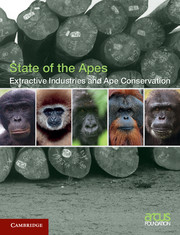Book contents
- Frontmatter
- Foreword
- Contents
- The Arcus Foundation
- Notes to readers
- Acknowledgments
- Photo
- Introduction
- Section 1
- 1 From global to local: the megatrends at the interface of apes and industry and the case of trade, law, and finance
- 2 Land tenure: industry, ape conservation, and communities
- 3 Ecological impacts of extractive industries on ape populations
- 4 Avoiding the chainsaws: industrial timber extraction and apes
- 5 Mining/oil extraction and ape populations and habitats
- 6 Artisanal and small-scale mining and apes
- 7 The bigger picture: indirect impacts of extractive industries on apes and ape habitat
- 8 Case studies of national responses to the impacts of extractive industries on great apes
- Section 2
- Annexes
- Acronyms and abbreviations
- Glossary
- References
- Index
1 - From global to local: the megatrends at the interface of apes and industry and the case of trade, law, and finance
Published online by Cambridge University Press: 05 June 2014
- Frontmatter
- Foreword
- Contents
- The Arcus Foundation
- Notes to readers
- Acknowledgments
- Photo
- Introduction
- Section 1
- 1 From global to local: the megatrends at the interface of apes and industry and the case of trade, law, and finance
- 2 Land tenure: industry, ape conservation, and communities
- 3 Ecological impacts of extractive industries on ape populations
- 4 Avoiding the chainsaws: industrial timber extraction and apes
- 5 Mining/oil extraction and ape populations and habitats
- 6 Artisanal and small-scale mining and apes
- 7 The bigger picture: indirect impacts of extractive industries on apes and ape habitat
- 8 Case studies of national responses to the impacts of extractive industries on great apes
- Section 2
- Annexes
- Acronyms and abbreviations
- Glossary
- References
- Index
Summary
Introduction
The greatest threats to the conservation of great apes and gibbons are forest loss and poaching. These impacts are manifested in a number of ways that include habitat loss, fragmentation and degradation by logging, expanding agriculture and food production for commercial and subsistence purposes, expanding infrastructures, forest fires, expanding mining, and changed land use. Other factors such as expanding human settlements in, or in the vicinity of, ape habitats, growing tourism, increased hunting for bushmeat, the live pet trade, and increased spread of human diseases also contribute to the loss of great ape and gibbon populations. It is the rapidly growing global demand for natural resources including land, water, minerals, energy, food, and forest products that lies at the heart of encroachment into ape habitats and there are a number of different drivers underlying these trends. This chapter focuses on the drivers that influence the expansion of extractive industries into ape habitats, highlighting various megatrends.
By focusing on megatrends, which are major societal and transformative forces, this chapter initially presents detail on the following global drivers: economic development, demographics, globalization, and infrastructure. The impacts of these drivers on minerals and mining, biodiversity, and industrial logging are further explored as these three factors are considered most relevant to presenting the linkages between global processes, extractive industries, and the status and welfare of apes.
- Type
- Chapter
- Information
- Extractive Industries and Ape Conservation , pp. 14 - 37Publisher: Cambridge University PressPrint publication year: 2014
- 1
- Cited by



